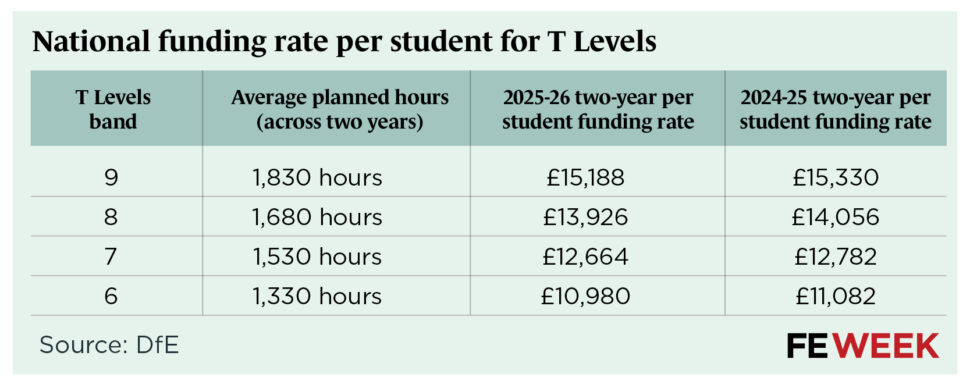The funding rate uplift for T Levels will be halved to 5 per cent next year, the government announced today.
Ministers told the sector last month that all national funding rates for students on 16 to 19 study programmes and T Levels would increase by 3.78 per cent in the 2025-26 academic year.
But the 10 per cent T Level-specific uplift that has been applied to the flagship qualifications in recent years was removed while the Department for Education calculated whether it would be affordable.
The DfE revealed today that they have landed at a 5 per cent T Level uplift.
It means that the funding rate for band 9 “very large” T Levels of 1,830 total planned hours for the programme’s two years will fall from £15,330 in 2024-25 to £15,188 in 2025-26.
Band 8 will reduce from £14,056 to £13,926, band 7 will shrink from £12,782 to £12,664 and band 6 will fall from £11,082 to £10,980.

Catherine Sezen, director of education policy at the Association of Colleges said: “Due to the complexity and breadth of T Levels, they often require greater teaching hours. As they have been introduced gradually, it is still early stages of delivery and class sizes are often smaller than for other qualifications.
“Colleges have been waiting for clarification on the T Level funding confirmed today and will be disappointed that the outcome is a cut to the uplift from 10 per cent to 5 per cent.”
The uplift decision comes weeks after a damning National Audit Office report revealed the DfE had an original budget of £1.94 billion for T Levels up to the end of 2024-25, but it only managed to spend £1.25 billion – meaning a £688 million underspend since the courses launched – due to low student take-up.
Last month’s funding rates announcement revealed that the DfE also can’t afford to fully fund “unprecedented” requests for in-year growth to cover this year’s rise in student numbers.
Adult skills funding allocations are also set to be slashed next year.
Employer support fund for health T Levels
The DfE said today it will run a “targeted” employer support fund in the 2025-26 financial year to support placements for health T Levels in both large and small employers.
The fund will also be available for small and medium-sized businesses providing placements for all other T Levels.
This funding “responds to feedback from previous pilots about higher upfront costs for these employers, and is designed to be used where placements could otherwise not be offered”.
Previous versions of employer support funds have suffered big underspends. Freedom of Information data from the DfE, obtained by FE Week last month, showed officials recouped over £3.9 million of the £8.5 million dished out through the one-year T Level Employer Support Fund available from April 2023 to March 2024.
Officials have not released a total allocation for the new special fund.
A spokesperson said: “We will publish more details in due course outlining how all placement funding will operate, including information on how to claim from the funds.”







Employer Support Fund for SMEs is welcome, but shall depend on how they implement it.
Business needs certainty they should aim to commit for a minimum 3 year period, they can make changes year on year but SMEs need to know it is not another 1 year and then disappeared scenario.
The costs for SMEs are higher than large businesses, so the ESF levels from last time should increase, SMEs do not have spare office/shop space, or equipment they have to buy a lot in for the placements and they do not have extra staff to allocate so all these costs need to be taken account of.
At the last ESF some Colleges offered businesses nominal amounts, it did not work.
Colleges should be able to offer more in the tough to source course areas and have the flexibility re student numbers etc. that they shall need.
They need to increase the funding levels or give more flexibility from last time, last time a lot of Colleges said they didn’t have the funding to offer the proper support.
If it is properly funded with no silly criteria imposed this should work and make things better for T level industry placements, hopefully it does.